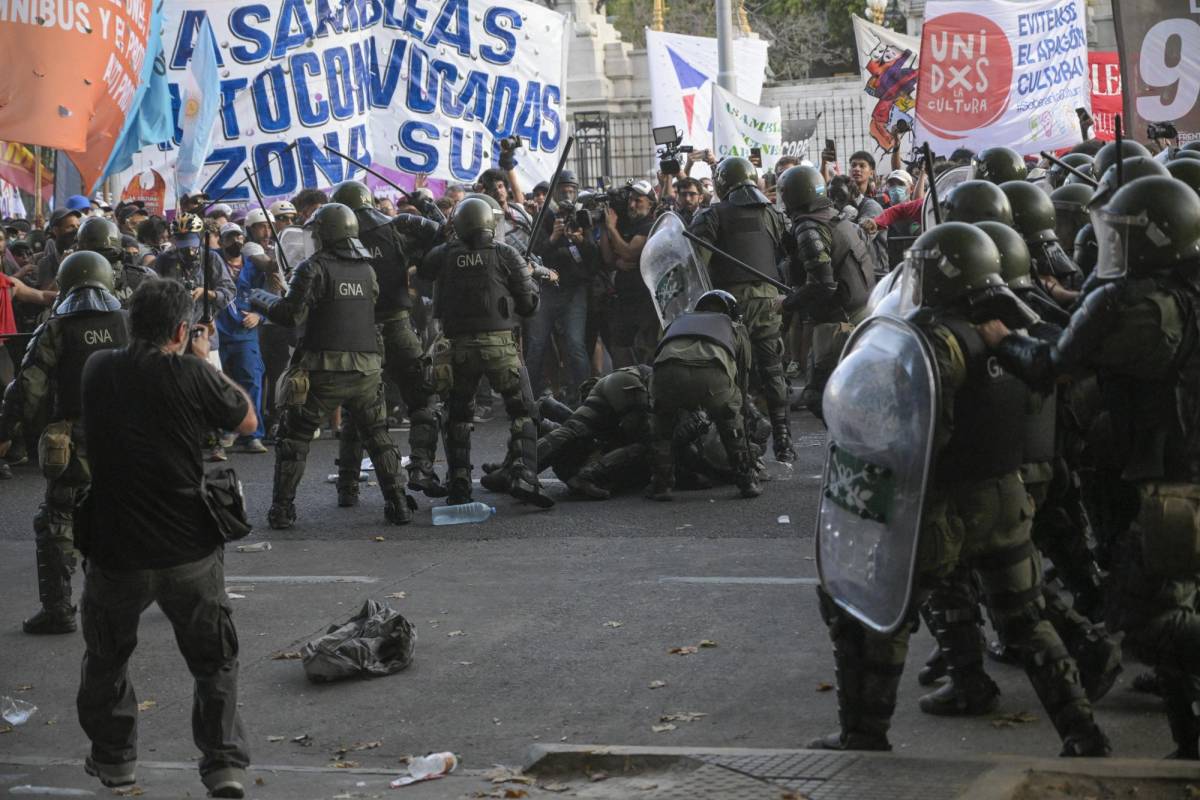
Argentinian police clash with protesters outside the Congress while lawmakers debate the Omnibus bill. Photo: Juan Mabromata/AFP.

Orinoco Tribune – News and opinion pieces about Venezuela and beyond
From Venezuela and made by Venezuelan Chavistas

Argentinian police clash with protesters outside the Congress while lawmakers debate the Omnibus bill. Photo: Juan Mabromata/AFP.
The Congress of Argentina approved in general the draft of the Omnibus Law issued by far-right President Javier Milei amid an environment of fear as police forces kept the Congress building surrounded, while citizens, social movements, artists, media, and trade union members demonstrated in front of the building in condemnation of the law.
On Friday, February 2, with 144 votes in favor and 113 against, the bill entitled Bases and Principles for the Freedom of Argentinians, better known as the Omnibus Law, which aims at the privatization of several public companies, was approved by the lower house of the Argentinian parliament. Congress will now discuss specific sections and norms of the bill.
Se aprobó la Ley de Bases en general con 144 votos positivos y 113 negativos (cuatro de ellos lo hicieron a voz alta). El próximo martes se volverá a sesionar desde las 14hs para el tratamiento de artículos en particular pic.twitter.com/250v7y2Tvg
— Santi Corei (@santi_corei) February 2, 2024
Due to the ongoing mobilization of Argentinian people and the pressure of some Congresspersons who rejected sections of the bill as part of the negotiation, the government of President Milei removed sections on pensions and retirement, defense, health, and social issues. This means that the government would not be able to issue laws by decree in those areas, although it could issue laws on economic, financial, security, tariff, energy, and administrative matters.
Argentina Court Declares Milei’s Labor Reform Unconstitutional
Police repression delayed parliamentary discussion on the bill
Police repressions against demonstrators in front of the Congress building delayed the discussions of the Omnibus Law bill, as opposition legislators left the building in protest on Thursday, February 1.
The Milei government activated a security operation that is expected to last throughout the duration of the Congressional discussion on the Omnibus Law.
During the second Congressional debate on the bill, the security forces surrounding the building attacked the demonstrators who were protesting against the law with tear gas and rubber bullets. Several people, including journalists, were injured, while an unspecified number of demonstrators were detained.
Amid the confrontations, opposition deputies withdrew from the debate and took to the streets to ask the security forces to stop the repression.
⚡️Diputados de la oposición argentina se retiran del Congreso a causa de los disturbios pic.twitter.com/OaAjLL3iYb
— Sepa Más (@Sepa_mass) February 1, 2024
“This is unnecessary… We don’t want any police personnel or demonstrators to be hurt,” said Congressman Máximo Kirchner of Union for the Homeland coalition.
According to Argentinian press, the current situation in Argentina is very similar to that of 2001, when the then President Fernando de la Rúa had to resign amid widespread protests against his neoliberal and privatization policies.
Debate resumes on Friday after adjournment amid police violence
Following the police repression on Thursday, the Congress approved adjourning the debate, for the fourth time. Discussions resumed on Friday.
The lack of consensus prevented a vote on the draft law, and the ruling party even presented a new draft incorporating changes in the chapter on privatizations.
The fiscal policy chapter was eliminated; the articles that modified the financing of the Native Forest and Glaciers laws were removed; the penalties for protest organizers were reduced; and the controversial definition of a meeting or demonstration as “the intentional and temporary congregation of thirty or more persons in a public space” was eliminated.
After the modified bill was approved by Congress, the government thanked the deputies, stating that “history will remember with honor all those who understood the historical context” and “decided to end the privileges of the caste and corporate republic in favor of the people” who “have been impoverished and starved for years by the political class.” However, this statement was made in a context where the government itself has been criticized because, in less than two months, President Milei’s policies have pushed at least 50% of families onto food assistance, while 70% of the public sector workers have fallen into poverty.
(RedRadioVE) by Ana Perdigón, with Orinoco Tribune content
Translation: Orinoco Tribune
OT/SC/DZ